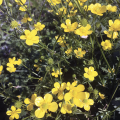Weed Control for Forages
A weed management plan will help ensure success in forage establishment. It is important to control weeds during establishment because newly emerged forage seedlings are extremely susceptible to weed competition. Weeds compete for water, nutrients, and sunlight.
Publications
Publication Number: P2726
Publication Number: P3266
Publication Number: P2880
Publication Number: P3865
Publication Number: P3276
News
Whether you have a large lawn, field, or pasture, you’ve probably had to deal with pesky weeds.





